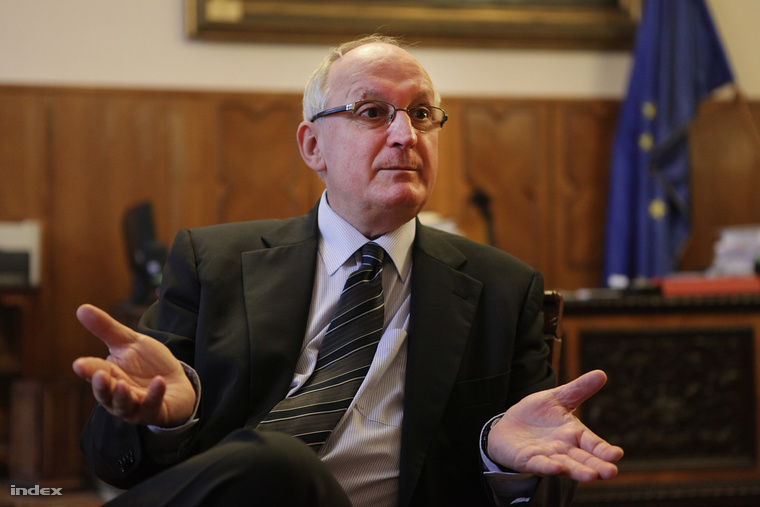A joint press release by Amnesty International Hungary and the Hungarian Helsinki Committee
The Council of Europe has been waiting for Hungary to take steps to execute the Baka case that also concerns the freedom of expression of judges. The inactivity and the telling silence of the Hungarian government is becoming all the more embarrassing, especially because Hungary is expected to give account of important guarantees of the judicial system. During the latest supervision effected in March, the Committee of Ministers also took note of the fact that the President of the Kúria requested the annulment of the Code of Ethics of Judges before the Constitutional Court.
The Committee of Ministers of the Council of Europe supervising the implementation of the judgments of the European Court of Human Rights put the case of former Chief Justice András Baka on the agenda again to examine the steps taken by Hungary to remedy the systemic problems revealed in the case. More than six years have passed since the delivery of the judgment and a whole year since the Committee of Ministers issued its strongest-ever decision (an interim resolution) to hold the Hungarian authorities accountable for the non-implementation of the judgment. Despite all this, the Hungarian state continues to ignore the committee’s expectations: it has not only failed to comply with the Committee of Ministers’ requests but also with its own commitments, even though the freedom of expression of Hungarian judges is also at stake in the case.
The human rights civil society organisations see the concerns expressed in their submission reflected in the recent decision of the Committee of Ministers. While the inaction of the Hungarian authorities has once again forced the committee to remind the government of its earlier commitments and the measures that have not been implemented, the decision explicitly expects the government to resolve the “chilling effect” on the freedom of expression of Hungarian judges. The Committee of Ministers indicated that it will also follow the developments regarding the Code of Ethics of Judges adopted last year and the potential annulment of the provisions on the freedom of expression of judges.
Six years of non-implementation
In 2011, when the Fidesz-KDNP government initiated a judicial reform possessing a supermajority in the Hungarian Parliament, the incumbent President of the Supreme Court of Hungary, András Baka publicly expressed criticism on several occasions against bills affecting the judiciary. At last, on 3 November 2011, he spoke up in the Parliament against the new legislation on the administration of courts. A couple of weeks later the Parliament adopted an act that terminated the mandate of András Baka prematurely and without the possibility of judicial control.
András Baka turned to the Strasbourg Court for legal remedy. The European Court of Human Rights established that Hungary violated the freedom of expression and the right to a court of the former chief justice. The judgment also warned of the chilling effect of the Baka case, causing fear of sanction in other judges and discouraging them from making critical remarks about legislation affecting the judiciary.
More than ten years have passed since the removal of András Baka, including the six years that lapsed since the judgment, but the Baka case is still open.
The Committee of Ministers examines the implementation of the judgment in an enhanced procedure and takes up the case year after year to make recommendations for its closure, to no avail. The Hungarian state passively waits – and expects- the closure of the case, demonstrating its unwillingness to provide guarantees safeguarding the freedom of expression and independence of Hungarian judges.
The lack of guarantees requested in the procedure is clearly marked by the fact that, in the context of the March review, several civil society organisations, including two Hungarian and one international judges’ associations, felt it was their duty to lodge a petition to support the decision. In their joint submission, the Hungarian Helsinki Committee and Amnesty International Hungary called attention to the fact that the current legislation encodes the possibility of pressure, and the judicial system still lacks guarantees to ensure the freedom of expression of judges. In addition, the Hungarian state has not only failed to create such conditions but has also continued its smear attacks on judges who have spoken out in favour of the independence of the judiciary.
In their joint communication, the civil society organisations highlighted:
- The Schadl-Völner case in which the President of the Chamber of Bailiffs approached the President of the National Office for the Judiciary and the President of the Metropolitan Court of Appeal to remove a group-leader district court judge, and Hungarian judges were denied a clarification as to the role of their leaders with respect to the attempt to exert undue pressure on a judge.
- The smear campaign directed against the members of the National Judicial Council (NJC) in the governmental propaganda press and public media, deliberately constructed with the active participation of government officials and judicial leaders, aimed at discrediting the NJC and its members, who speak out in protection of judicial independence.
- That András Zs. Varga as President of the Kúria requested the annulment of the Code of Ethics of Judges at the Constitutional Court, even though the adoption of the new code was the only substantive step forward in the implementation of the Baka case.
The Committee of Ministers will resume consideration of the Baka case in December.
